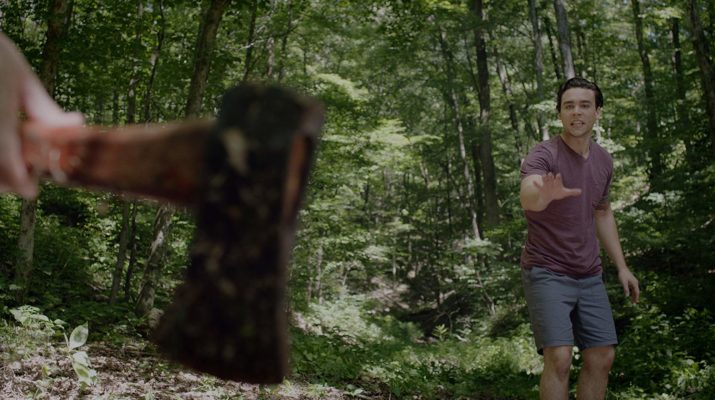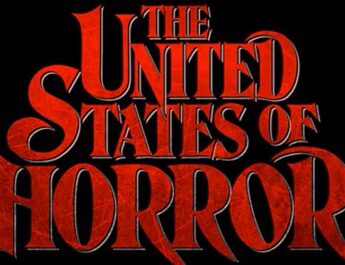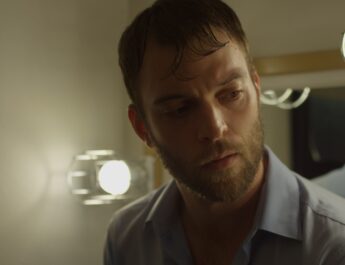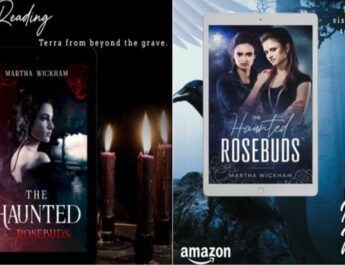Chris Blake’s latest feature All Light Will End tells the story of young, successful horror novelist, Savannah, whose new book is taking the genre by storm. Her father, the police chief of her small hometown, investigates murders and foul play too grim for their bucolic life. As she and her friends settle in for a relaxing weekend at her childhood home, the dark secret at the crux of her success stirs in her dreams and seeps into her reality. The film stars Sarah Butler (I Spit on Your Grave), Andy Buckley (Shameless), Sam Jones III (Smallville), John Shuck (Tales from the Crypt: Demon Knight), Ashley Pereira (Nashville), Alexandra Harris (Hellraiser: Judgement), Katie Garfield (Birth of a Nation) and Ted Welch (True Blood) co-star. All Light Will End is being released November 3 by Gravitas Ventures, you can pre-order it here https://itunes.apple.com/us/movie/all-light-will-end/id1435972559. In this below exclusive interview we discuss everything All Light Will End with Chris.
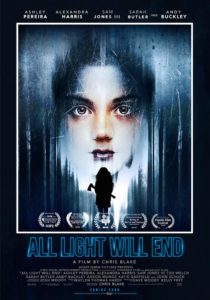
– How long did it take you to write the script for All Light Will End?
That’s a bit of a loaded question when you’re the writer and the director or even for a writer and producer. Because even once you’ve completed the shooting draft of a script, you’re still rewriting, improving character arcs, fixing things that didn’t work, all the way through the editing process. I’d say the actual script took a few weeks before we had something we were happy with, but we had written a couple of versions of the story that didn’t work before that. There are, however, elements from each of those earlier scripts that made their way into the script that became All Light Will End.
– Did you have specific actors in mind when you were casting?
Sure. We knew when we were writing the script that we wanted Andy Buckley to play the role of Chief David. Andy is an actor I’ve always admired, and it was great getting to work together. I wrote the leading role of Savannah specifically for Ashley Pereira, and Ted Welch was attached to play Jack from the beginning. The role of the mother (Diana), however, was a tough role to cast. We needed her to have such a powerful and haunting presence. We discussed a lot of different options and even had some other talented actors attached to the role at times, but nothing was working. Eventually, my producing partner came to me and told me to check out a film called, I Spit On Your Grave. He said we should look at the lead actress and consider her for the role of Diana. So, I watched the film and then reached out to Sarah’s team the next day. Sarah was what we were looking for and she brings such a tremendous amount of depth to this role and to the movie.
– We read that a lot of things in the final film were different than what was original in the script? Can you elaborate on this without giving too much away?
Yeah that’s true. I think that’s true for a lot of movies actually. Sometimes, you write what’s in your head, and then when you see it or you hear it, you know it needs to be something else. And then other times your producer says, “yeah, we had the money to do it that way before you cast this person and shot this other scene the way you wanted too, now we don’t have the money to do it this way anymore.” That’s always fun to hear. But you adjust and have to get creative and often times the movie ends up being better because of it. Then editing is of course a totally different discussion because everything changes when you see what you’ve shot. It’s like a puzzle that could go several different ways and a lot of times it’s different (and hopefully better) than the way you wrote it.
-With recent indie hits such as The Witch and It Follows going mainstream, did these type of films inspire your movie? If not, what did you look to for inspiration?
I loved both of those films and both were referenced several times when making All Light Will End. And Robert did such a fantastic job with the screenplay for, The Witch. Have you read it? It’s amazing. I haven’t seen the script for It Follows but the film and score were fantastic. I’d love to read the script someday. I watched a lot of films, read a ton of scripts, and created playlists on Spotify for different scenes when I was writing All Light Will End. I watched early Roman Polanski — Knife In The Water is one my favorite films. It’s the epitome of indie filmmaking, but way ahead of its time – and I also watched a lot of JJ Abrams and early Spielberg. I know the latter two seem like odd choices for a low budget indie film, but they are both profound filmmakers. I realize it sounds pretentious to say ‘oh I’m inspired by this person, or that person’, but really it’s about seeing things that you can aspire to and applying lessons that you’re learning from them.
-In darker, horror films the score plays a crucial role because it creates suspense and tells the audience when they should be scared. Why did you pick the two composers that you did?
The composer, Waylen Thomas Hardy, is actually a good friend of mine and he and I started working on pieces for the film while I was writing the script. I’d call him and say ‘hey, I need something like this for a scene I’m working on,’ and he’d do it and send it over. So, some of the score helped shape the writing before we had even shot a frame. Although, most of what we did during the writing process never made it into the film, it was a really interesting process. And Dave Moody was a producer on the film who also happened to be a Grammy nominated artist. Waylen and I would put something together and send it to Dave, then he’d make suggestions or make a few changes and send it back. It was a really cool process.
-You have directed a lot of short films before All Light Will End. What are some of the biggest differences in making the two, besides length?
Well, there are many moving parts in a feature film. There’s usually more locations, more actors, a larger crew, more shoot days and there’s more pressure. I look at short films as a low budget learning experience where I get to try out new types of characters, new camera angles, and tell stories that are harder to get funded at the feature level. Moreover, if the short film never goes anywhere, then it just doesn’t. You’re out a little time and a little money but you’ve learned something new, and you’re better for it. With a feature, however, I think the goals are different. You want the film to get out there and so do the people that put the money into it. And while all types of filmmaking offer different opportunities, a feature film gives you a platform on a larger scale.
-Has there been a horror film lately that has really stood out to you? If so, why?
I like what Scott Beck and Bryan Woods did with the script for A Quiet Place, and I loved seeing how John Krasinski made it fit his vision. I’m also a big fan of Ari Aster’s recent film Hereditary, and although it raised some controversy, I loved Aronofsky’s Mother! – It was bonkers and downright genius. Oh and if you haven’t seen the Spanish film, Verónica, do yourself a favor.

